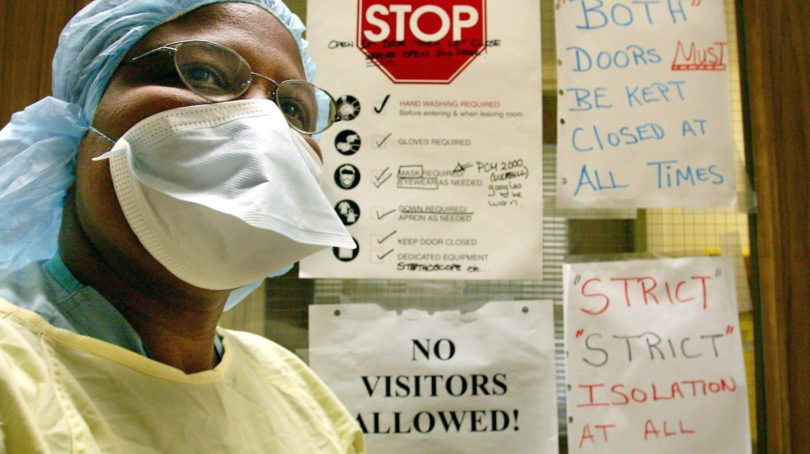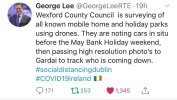The Bearer of Good Coronavirus News
Stanford scientist John Ioannidis finds himself under attack for questioning the prevailing wisdom about lockdowns.
By Allysia Finley
Updated April 24, 2020 5 14 pm ET
Defenders of coronavirus lockdown mandates keep talking about science. “We are going to do
the right thing, not judge by politics, not judge by protests, but by science,” California’s Gov.
Gavin Newsom said this week. Michigan Gov. Gretchen Whitmer defended an order that, among
other things, banned the sale of paint and vegetable seeds but not liquor or lottery tickets.
“Each action has been informed by the best science and epidemiology counsel there is,” she
wrote in an op-ed.
But scientists are almost never unanimous, and many appeals to “science” are transparently
political or ideological. Consider the story of John Ioannidis, a professor at Stanford’s School of
Medicine. His expertise is wide-ranging—he juggles appointments in statistics, biomedical
data, prevention research and health research and policy. Google Scholar ranks him among the
world’s 100 most-cited scientists. He has published more than 1,000 papers, many of them
meta-analyses—reviews of other studies. Yet he’s now found himself pilloried because he
dissents from the theories behind the lockdowns—because he’s looked at the data and found
good news.
In a March article for Stat News, Dr. Ioannidis argued that Covid-19 is far less deadly than
modelers were assuming. He considered the experience of the Diamond Princess cruise ship,
which was quarantined Feb. 4 in Japan. Nine of 700 infected passengers and crew died. Based
on the demographics of the ship’s population, Dr. Ioannidis estimated that the U.S. fatality rate
could be as low as 0.025% to 0.625% and put the upper bound at 0.05% to 1%—comparable to
that of seasonal flu.
“If that is the true rate,” he wrote, “locking down the world with potentially tremendous social
and financial consequences may be totally irrational. It’s like an elephant being attacked by a
house cat. Frustrated and trying to avoid the cat, the elephant accidentally jumps off a cliff and
dies.”
Dr. Ioannidis, 54, likes metaphors. A New York native who grew up in Athens, he also teaches
comparative literature and has published seven literary works—poetry and fiction, the latest
being an epistolary novel—in Greek. In his spare time, he likes to fence, swim, hike and play
basketball.
Early in his career, he realized that “the common denominator for everything that I was doing
was that I was very interested in the methods—not necessarily the results but how exactly you
do that, how exactly you try to avoid bias, how you avoid error.” When he began examining
studies, he discovered that few headline-grabbing findings could be replicated, and many were
later contradicted by new evidence.
Scientific studies are often infected by biases. “Several years ago, along with one of my
colleagues, we had mapped 235 biases across science. And maybe the biggest cluster is biases
that are trying to generate significant, spectacular, fascinating, extraordinary results,” he says.
“Early results tend to be inflated. Claims for significance tend to be exaggerated.”
An example is a 2012 meta-analysis on nutritional research, in which he randomly selected 50
common cooking ingredients, such as sugar, flour and milk. Eighty percent of them had been
studied for links to cancer, and 72% of the studies linked an ingredient to a higher or lower risk.
Yet three-quarters of the findings were weak or statistically insignificant.
Dr. Ioannidis calls the coronavirus pandemic “the perfect storm of that quest for very urgent,
spectacular, exciting, apocalyptic results. And as you see, apparently our early estimates seem
to have been tremendously exaggerated in many fronts.”
Chief among them was a study by modelers at Imperial College London, which predicted more
than 2.2 million coronavirus deaths in the U.S. absent “any control measures or spontaneous
changes in individual behaviour.” The study was published March 16—the same day the Trump
administration released its “15 Days to Slow the Spread” initiative, which included strict social-
distancing guidelines.
Dr. Ioannidis says the Imperial projection now appears to be a gross overestimate. “They used
inputs that were completely off in some of their calculation,” he says. “If data are limited or
flawed, their errors are being propagated through the model. . . . So if you have a small error,
and you exponentiate that error, the magnitude of the final error in the prediction or whatever
can be astronomical.”
“I love models,” he adds. “I do a lot of mathematical modeling myself. But I think we need to
recognize that they’re very, very low in terms of how much weight we can place on them and
how much we can trust them. . . . They can give you a very first kind of mathematical
justification to a gut feeling, but beyond that point, depending on models for evidence, I think
it’s a very bad recipe.”
Modelers sometimes refuse to disclose their assumptions or data, so their errors go
undetected. Los Angeles County predicted last week that 95.6% of its population would be
infected by August if social distancing orders were relaxed. (Confirmed cases were 0.17% of the
population as of Thursday.) But the basis for this projection is unclear. “At a minimum, we need
openness and transparency in order to be able to say anything,” Dr. Ioannidis says.
Most important, “what we need is data. We need real data. We need data on how many people
are infected so far, how many people are actively infected, what is really the death rate, how
many beds do we have to spare, how has this changed.”
That will require more testing. Dr. Ioannidis and colleagues at Stanford last week published a
study on the prevalence of coronavirus antibodies in Santa Clara County. Based on blood tests
of 3,300 volunteers in the county—which includes San Jose, California’s third-largest city—
during the first week of April, they estimated that between 2.49% and 4.16% of the county
population had been infected. That’s 50 to 85 times the number of confirmed cases and implies
a fatality rate between 0.12% and 0.2%, consistent with that of the Diamond Princess.
The study immediately came under attack. Some statisticians questioned its methods. Critics
noted the study sample was not randomly selected, and white women under 64 were
disproportionately represented. The Stanford team adjusted for the sampling bias by weighting
the results by sex, race and ZIP Code, but the study acknowledges that “other biases, such as
bias favoring individuals in good health capable of attending our testing sites, or bias favoring
those with prior Covid-like illnesses seeking antibody confirmation are also possible. The
overall effect of such biases is hard to ascertain.”
Dr. Ioannidis admits his study isn’t “bulletproof” and says he welcomes scrutiny. But he’s
confident the findings will hold up, and he says antibody studies from around the world will
yield more data. A study published this week by the University of Southern California and the
Los Angeles County Department of Public Health estimated that the virus is 28 to 55 times as
prevalent in that county as confirmed cases are. A New York study released Thursday estimated
that 13.9% of the state and 21.2% of the city had been infected, more than 10 times the confirmed
cases.
Yet most criticism of the Stanford study has been aimed at defending the lockdown mandates
against the implication that they’re an overreaction. “There’s some sort of mob mentality here
operating that they just insist that this has to be the end of the world, and it has to be that the
sky is falling. It’s attacking studies with data based on speculation and science fiction,” he says.
“But dismissing real data in favor of mathematical speculation is mind-boggling.”
In part he blames the media: “We have some evidence that bad news, negative news [stories],
are more attractive than positive news—they lead to more clicks, they lead to people being
more engaged. And of course we know that fake news travels faster than true news. So in the
current environment, unfortunately, we have generated a very heavily panic-driven, horror-
driven, death-reality-show type of situation.”
The news is filled with stories of healthy young people who die of coronavirus. But Dr. Ioannidis
recently published a paper with his wife, Despina Contopoulos-Ioannidis, an infectious-disease
specialist at Stanford, that showed this to be a classic man-bites-dog story. The couple found
that people under 65 without underlying conditions accounted for only 0.7% of coronavirus
deaths in Italy and 1.8% in New York City.
“Compared to almost any other cause of disease that I can think of, it’s really sparing young
people. I’m not saying that the lives of 80-year-olds do not have value—they do,” he says. “But
there’s far, far, far more . . . young people who commit suicide.” If the panic and attendant
disruption continue, he says, “we will see many young people committing suicide . . . just
because we are spreading horror stories with Covid-19. There’s far, far more young people who
get cancer and will not be treated, because again, they will not go to the hospital to get treated
because of Covid-19. There’s far, far more people whose mental health will collapse.”He argues that public officials need to weigh these factors when making public-health decisions, and more hard data from antibody and other studies will help. “I think that we should
just take everything that we know, put it on the table, and try to see, OK, what’s the next step,
and see what happens when we take the next step. I think this sort of data-driven feedback will
be the best. So you start opening, you start opening your schools. You can see what happens,”
he says. “We need to be open minded, we need to just be calm, allow for some error, it’s
unavoidable. We started knowing nothing. We know a lot now, but we still don’t know
everything.”
He cautions against drawing broad conclusions about the efficacy of lockdowns based on
national infection and fatality rates. “It’s not that we have randomized 10 countries to go into
lockdown and another 10 countries to remain relatively open and see what happens, and do that
randomly. Different prime ministers, different presidents, different task forces make decisions,
they implement them in different sequences, at different times, in different phases of the
epidemic. And then people start looking at this data and they say, ‘Oh look at that, this place did
very well. Why? Oh, because of this measure.’ This is completely, completely opinion-based.”
People are making “big statements about ‘lockdowns save the world.’ I think that they’re
immature. They’re tremendously immature. They may have worked in some cases, they may
have had no effect in others, and they may have been damaging still in others.”
Most disagreements among scientists, he notes, reflect differences in perspective, not facts.
Some find the Stanford study worrisome because it suggests the virus is more easily
transmitted, while others are hopeful because it suggests the virus is far less lethal. “It’s
basically an issue of whether you’re an optimist or a pessimist. Even scientists can be optimists
and pessimists. Probably usually I’m a pessimist, but in this case, I’m probably an optimist.”
Ms. Finley is a member of the Journal’s editorial board.

www.t-online.de

 )
)

